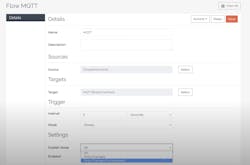Five years ago, MQTT (message queuing telemetry transport) was a little-known industrial communications protocol for transferring data from industrial devices to other databases for aggregation and analysis. In some of the first sessions on MQTT I attended, most discussion focused on MQTT’s low bandwidth overhead which did not bog down industrial networks with unnecessary amounts of data.
Not as often discussed was how MQTT functions so efficiently at data transfer without impacting the devices from which it transfers data. Previous poll and response methods of data acquisition could impact the performance of drives and controllers with their regular polling of the devices for data. MQTT, however, operates by having the devices send the data themselves (when data changes) to a separate server. This server can then be polled by any number of other systems seeking the device’s data without impacting operation of the device itself.
An added benefit is the security MQTT provides. With its one-way direction of data transmission (from the device to the server), no communications are sent directly to the device itself via MQTT.
In the past few years, the beneficial facts about MQTT’s operations have been spreading fast and it’s quickly becoming one of the de facto methods of data transfer, along with OPC UA. In fact, the two protocols are often used in conjunction with each other—with OPC UA used for machine-to-machine communications and MQTT used for data transfer to cloud or edge servers for analysis.
MQTT’s increasing profile has now been further supplanted by HighByte’s announcement that its new HighByte Intelligence Hub version 1.2 expands the software’s support for open standards and open platforms, including MQTT Sparkplug and OpenJDK.
For those unfamiliar with Open JDK, it helps to first understand JDK. JDK (Java Development Kit) is a software development environment used in Java platform programming that contains the Java Runtime Environment. JDK launched in 1995 and has been known as the Java SE platform since 1998. Oracle JDK is a well-known version of this development environment. Open JDK is the free, open-source implementation of the Java SE Platform Edition.
In addition to MQTT Sparkplug and Open JDK support, HighByte Intelligence Hub version 1.2 includes model and instance categorization, enhanced security, and more flexible presentation of information models and output formats.
HighByte says its Intelligence Hub is the first DataOps product “purpose-built for industrial environments.” According to HighByte, DataOps is a new approach to data integration and security that aims to improve data quality, reduce time spent preparing data for analysis, and encourage cross-functional collaboration within data-driven organizations.
Leaders relevant to this article:



